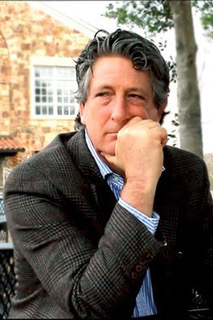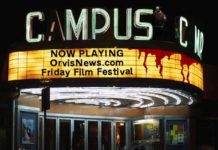Pictured is the main house in the novel, Lakewood.
Submitted photos
Last spring — April 26, 2021 — to be exact, I received an email with the above greeting.
Much to my surprise, I was contacted by a college professor and published poet from Reinhardt University in Georgia who had enjoyed the Arcadia books that Jane Currie and I had written about Jamestown and the Chautauqua Lake region nearly 20 years ago. William Walsh, an Atlanta resident since high school, had lived in Lakewood until the age of 8 and was completing his research of our area for the publication of his first novel, Lakewood. He wondered if I had any suggested venues for book signings a year later when it would be published in May 2022. His request immediately piqued my curiosity, and I didn’t hesitate to be of assistance. I knew I could easily facilitate some connections for him, starting with the Lakewood Memorial Library, and recognized it as an interesting project for me as well as I share Walsh’s passion for the history of Chautauqua County.
BACK TO HIS ROOTS
Last July, having achieved success in the literary world, Walsh returned here to his hometown to complete his research for the sequel to Lakewood which had almost been completed, but he wanted to ensure the accuracy of his memory.We met during that brief visit when he generously conducted an author talk and writing workshop at the Lakewood Memorial Library where a small group of residents were introduced to him and some of his poetry.
Bill Walsh is pictured surrounded by his books.
Thus began our literary journey. I fully appreciate Walsh’s passion for Chautauqua County in general because, like him, my entire family has been rooted here for several generations.
But I wondered what specifically did he find so intriguing about Lakewood?
Many have relocated since their childhood and, despite lingering memories, never physically returned “home.” I soon came to understand that our shared passion for the lake itself and treasured memories of relatives during our formative years had led us both back.For Walsh, his fondest memories were of times spent with his grandfather Arthur Card on fishing excursions and on mini road trips around the county when the elder Card would point out and elaborate on the history and significance of places and people in the Chautauqua region that they encountered.
In addition, Walsh has always associated this location with summer and Christmas vacation visits to his grandparent’s Lakeview Avenue house which still stands there today. His grandfather spent 50 years in that house where his mother grew up. Although Walsh admittedly hasn’t maintained childhood friendships, his mother Elaine Card Walsh, a Southwestern High School graduate, keeps in touch with former neighbors and checks the online edition of The Post-Journal. His deceased father, William Walsh, was a Jamestown High School graduate whose family roots in the area dated back to the Civil War.Walsh believes his childhood ended in 1973 when he and his parents moved to Dallas and were physically separated from his grandfather and other family.
Walsh was unhappy to leave the area and its history thinking the departure tantamount to “heresy.”

Pictured is the cover of William Walsh’s book, Lakewood.
“As a kid, I knew the town,” Walsh said. “I’d walked the streets.I rode my bike around town. I went back to the town and walked the streets and that was enjoyable. Recreating Lakewood in 1973 allowed me to recreate a portion of my childhood that long ago evaporated. … The buildings and your house might still be there, but you can’t recreate that in real life (but) I recreated it in the novel.To me that was the most important thing. … Recreating the town allowed me to honor my grandfather and others who are long gone.”
THE STORY WALSH TELLS
The novel begins in that same year — 1973 — when the protagonist Robert English, a student at the fictional Chautauqua College in Lakewood, takes a job house-sitting near campus for the summer rather than return home to Georgia for the summer.That house, to his surprise, was his own childhood home filled with memories including those of a family tragedy. It becomes a summer of self-discovery for Robert and that Lakeview Avenue house becomes central to the plot. Everything of note that occurred in his past took place there. Although he had anticipated “a quiet summer of adventure,” an oxymoron to be sure, he must find the answers to his twin sister’s death and a bevy of other emotional issuesbefore he can move forward with his own life.Although the book is somewhat autobiographical, Walsh considers it a work of fiction with a cast of memorable characters and a handful of actual residents sprinkled throughout the story.
Interestingly, I learned a little about Lakewood’s sequel, All Truth Be Murdered, before I received my copy of the original story.In that sneak preview, I learned that the reader will be able to follow the main characters, Robert English and Annie Spangler, 25 years later.Although Lakewood is written in a journal format, the sequel employs a first-person narrative as Robert continues to overcome his challenges.
BECOMING A WRITER

William Walsh
Although Walsh once considered a career in psychiatry, his head was always filled with ideas although he did not know how to put those down on paper. From an early age, he made up stories and secretly harbored the idea of becoming a famous writer, enamored especially with novels, movies, and screenplays. He credits his parents, both voracious readers, for instilling that love in him. To his dismay, he was a poor student grade-wise and not until years later realized that his undiagnosed dyslexia was a huge factor. His frustration began to decrease when his seventh grade teacher gave a poetry assignment to the class.In retrospect, until then he conceded his writing “career” had been nothing more than “huge wastelands of drivel.”
Not until his freshman year at Georgia State did his confidence kick in.At that time, he was introduced to narrative poetry written by a bevy of Southern writers.He discovered that he could readily adapt his stories into narrative poems. Happily, he had found his niche because he had plenty of stories to tell.After reading Professor David Bottom’s poem, “Shooting Rats at Bibb County Dump,” Walsh was off and running.
Among his own collections are themes of explorations of place, memory, imagination, and regret. Those titles include The Conscience of My Other Being (2005), Lost in the White Ruins (2014), and Fly Fishing in Times Square (2020). Lakewood: A Novel is available at Good Neighbor Bookstore, Lakewood, at the Chautauqua Institution Bookstore, and on Amazon.
ABOUT THE AUTHOR
Walsh’s academic credentials are impressive.He earned an A.A. in Liberal Arts from Georgia’s DeKalb College in 1983, an A. B. in English from Georgia State University in 1985, and an M. F. A. in creative writing from Vermont College in Montpelier in 1991.
Following his formal education, he became enamored with the works of the wealth of writers he discovered in the South.He then began to immerse himself in that literary world by attending writer’s symposiums, gleaning much from the likes of Erskine Caldwell and James Dickey. More than 100 of his interviews with contemporary authors are published in over 50 journals. His 1990 publication So Shall I Know Thee: Interviews with Southern Writesr was a finalist for the “Georgia Author of the Year” award.His days are jampacked with lecture presentations, symposiums, and the teaching of literature, often traveling to a variety of locations.
According to a recent column in the regional newspaper Pickens County Progress, David Altman, one of his literary peers, critiqued Lakewood in this manner: “Reinhardt University’s William Walsh has written a novel that may very well be one of the best of the year … a highly personalized account of a young man’s coming of age in the idyllic small town of Lakewood, New York, on the shores of Lake Chautauqua, near Buffalo. … A book rich with dialogue and unforgettable characters — like we have all known…”
Altman added, “Walsh, a prolific writer of seven books who also directs the Etowah Valley Masters of Fine Arts (MFA) program at Reinhardt University, shows a range in his writing that blends memories with imagination and historical events with personal experience … (Lakewood) a compelling story about human nature, our past and our ability to overcome (and later embrace) our youth.”
Credit: Source link





























